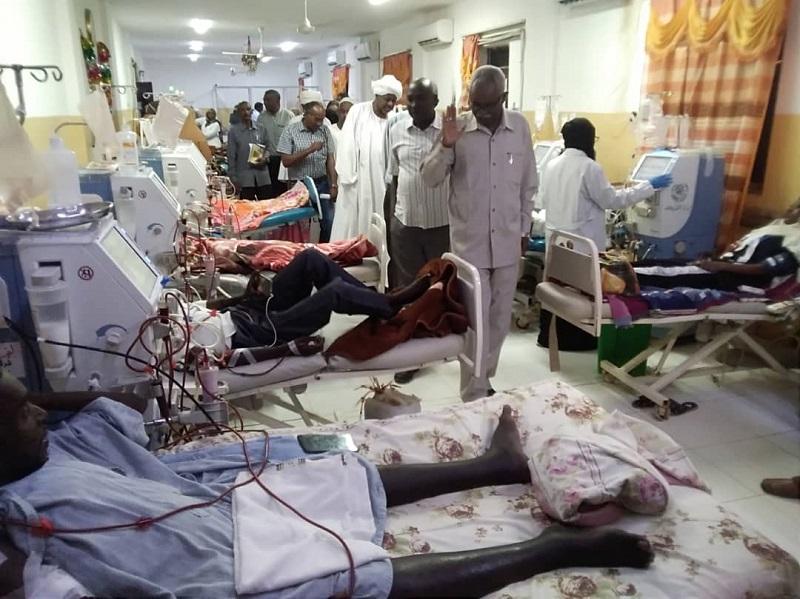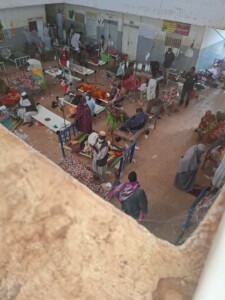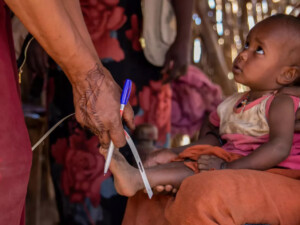Medicines hard to find in war-torn Sudan, kidney patients desperate

Dialysis patients travelled to Kosti in White Nile state for treatment, May 2023 (File photo: SUNA)
Health centres in Sennar, South Darfur, and North Kordofan are reporting a dire shortage of medicines. A kidney dialysis centre in El Obeid, capital of North Kordofan, closed its doors yesterday, while a similar centre in Nyala, South Darfur, may soon face the same fate.
The Sennar Youth Association posted an ‘emergency call’ on its Facebook page yesterday, saying the lives of millions of people in the state are in danger. “Displaced, among them many pregnant women, surviving in makeshift shelters in villages in the areas of Singa, Dinder and Sharg Sennar are living in dire conditions, with a complete absence of health care centres and medicines.”
The Sennar youth reported “similar suffering for patients suffering from kidney failure, diabetes, and high blood pressure”. They further noted that people have to walk for long distances in search of communication services after the networks were cut off.
They called for lifting the Rapid Support Forces (RSF) siege on Sennar, Singa, and Dinder, “the opening of safe corridors to saving citizens from the hell of suffering and the looming famine resulting from the severe shortage of food”.
‘Continuous search’
A medical source told Radio Dabanga from the South Darfur capital of Nyala that most life-saving medications in the city are depleted. “Patients and their families are suffering greatly in their continuous search for a dose of medicine.”
The Nyala Emergency Room yesterday reported a shortage of medical equipment and supplies at the city’s kidney dialysis centre, as the number of patients increased.
In a video recording posted on its Facebook page, the emergency room stated that apart from dwindling medical reserves, several dialysis machines are malfunctioning. At the same time, kidney patients coming from various places in Darfur are requesting treatment, as most dialysis centres in the region have been closed or damaged in battles.
In June, for instance, the RSF shelled the only remaining dialysis centre in El Fasher, North Darfur, causing severe damage to equipment and buildings.
Kidney patient Abdelrahman Saleh told Dabanga that he has been “undergoing dialysis at the Nyala centre on a regular basis for 11 years,” but now fears for his life.
“The available medical supplies are sufficient for only 30 washes,” he said, and called on “health authorities and organisations to extend a helping hand”.
No dialysis solutions
The El Jemeih Kidney Dialysis Centre in El Obeid stopped operating yesterday, due to the lack of dialysis solutions, a medic told Radio Dabanga.
“The centre not only provided services to kidney patients in North Kordofan, but also to those in neighbouring states,” he said. “Hundreds of patients will lose their lives if the centre does not resume its work as soon as possible.”
A merchant at the El Obeid Grand Market, who preferred to remain anonymous, confirmed that the RSF control all entrances to the city.
“The RSF are now holding eight lorries loaded with goods in Bara, under the pretext that they are carrying supplies for the army, while they are just basic commodities to be sold to us in El Obeid.”
Army control
Already in end April last year, about two weeks after war erupted between the Sudanese Armed forces (SAF) and the RSF, the director of the National Centre for Kidney Diseases warned that “we may lose 12,000 human beings soon” because of a serious shortage of dialysis materials.
Kidney patients in Khartoum state, overrun by the RSF, travelled to other places to search for treatment in a renal dialysis centre.
Also in the so-called safe states, controlled by the Sudanese army, kidney patients face multiple challenges. In August last year, two kidney patients died following a series of dialysis machine breakdowns in Ed Damer in northern Sudan.
The dialysis centre in Ed Debba in Northern State closed its doors for its 62 patients in June, because of a delay in the delivery of spare parts.
A month earlier, kidney patients in Port Sudan, Red Sea state, staged a protest in front of the city’s dialysis centre, condemning the centre’s frequent interruptions, and the Ministry of Health’s failure to allocate dialysis machines received from abroad.











 and then
and then